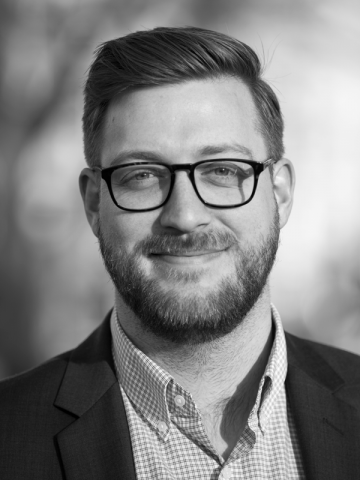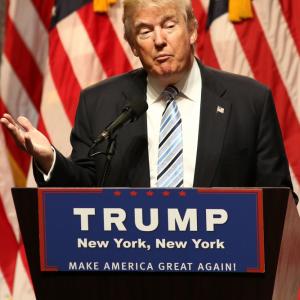
As the director of the president’s office and director of advocacy, Jim leads and implements the strategic work and goals of Sojourners.
Prior to joining Sojourners, he served as a legislative aide to Senator Mary Landrieu (D-LA) and as a legislative correspondent on the Democratic staff of the Senate Committee on Small Business and Entrepreneurship following an internship in the office of Senator Mark Warner (D-VA). Before his work in the Senate, he spent time in Kerala, India, through the Young Adult Volunteer Program (YAV) through the Presbyterian Church (USA).
A graduate of The George Washington University, Jim lives in Washington, D.C., with his wife, Brittany Jablonsky, Senior Director of Communications at the Farm Credit Council. He is a member of the Presbyterian Church (USA), an avid (though abysmal) golfer, and life-long supporter of Motherwell FC and Arsenal.
Posts By This Author
It’s Time to Be the Conscience of American Politics
I believe fervently in the words of Rev. Dr. Martin Luther King Jr., who said that “the church is not called to be the master or servant of the state, but to be the conscience of the state.” In that vein, we will be neither chaplain nor sycophant to our new political leaders. Instead, we seek to be a faithful conscience, serving as a bridge-builder and offering prophetic critique (and pressure) when necessary.
Biden Must Do More Than Clean Up Trump's Mess
AS THE BIDEN administration enters the White House, it must focus not only on repairing the damage caused by four years of the Trump administration but also push forward a bold agenda using all available channels: unilateral executive actions, the rule-making process, and collaboration with Congress. Here’s a wish list for the first 100 days.
While we await mass distribution of a COVID-19 vaccine, Americans are living through some of the highest infection and death numbers we’ve seen at any point in the pandemic. A coordinated national response to the coronavirus must be a top priority for the administration. This includes a national mask mandate, a robust and coordinated federal strategy, a national vaccine distribution strategy, and additional support and stimulus to individuals, health systems, and states to address the health and economic impacts of the disease.
While the wealthy and those with stocks and investments have only seen their wealth increase over the past year, the gap between the richest and poorest Americans has expanded dramatically. A progressive economic agenda is needed to bolster and support those with low and middle incomes (roughly 80 percent of Americans). The priorities should include rolling back tax cuts for the wealthiest; forgiving federal student debt; increasing the federal minimum wage; ensuring access to paid sick and family leave and affordable child care; modernizing unemployment insurance; and introducing a budget that supports safety net programs and invests in the people and communities struggling the most.
Candidates Were Asked How They'd Address Poverty. Here's How They Responded
In the 2020 election cycle, most of the Democratic primary candidates provided videos, including Vice President Joe Biden. The Christian leaders in the Circle of Protection have asked for a video and/or statement on poverty policy from President Trump, but his campaign has not responded to repeated requests.
Our Tax Laws Favor Wealthy People. Jesus Prioritized Those in Poverty
Despite our immense wealth as a country, poverty has always been a problem in the United States. It remains as an insidious legacy of slavery and systemic racism as well as an ever-present barrier in largely white rural communities and increasingly among Americans living in suburban communities.
Normal Wasn't Working: Economic Justice in a Post-COVID Reality
The COVID-19 pandemic has revealed the dark and disturbing injustices and inequities that have always existed in our health care, economy, and government. Though the virus may not discriminate, our humanmade systems and structures do. And in the United States this means that those who are feeling the impact of this disease most acutely are those who have been historically, structurally, systemically, and politically marginalized and oppressed.
Charitable Giving is Down Due to Trump’s Tax Overhaul
PRESIDENT TRUMP SPENT a large portion of his State of the Union speech in February touting his economic accomplishments, including cutting taxes and “job-killing regulations.” But what has America gotten in exchange for the 2017 Republican tax overhaul?
First, 2018 showed the largest drop in household charitable contributions since the Great Recession and the first drop in more than five years. Despite steady economic growth over the past 10 years and a more than 5 percent increase in individual giving the year before, this dramatic decline has left many organizations—including local churches, food pantries, and homelessness services—struggling to meet the needs of those they serve.
The Republican-passed Tax Cuts and Jobs Act of 2017 was the most sweeping overhaul to the federal tax code in decades. Among other things, it doubled the standard deduction. It is no longer cost-effective for most Americans to itemize donations. This creates a “giving gap” between middle-class donors and ultra-wealthy donors.
Even some Republicans found these changes controversial. They were unable to hide that most benefits would accrue to Americans with incomes in the top 5 percent.
The Street Child World Cup and the Right to Play
The United States did compete in a World Cup in Russia this year: the Street Child World Cup, a tournament and conference highlighting homeless youth's ideas for a better future.
Men: Women Spoke Up. How Will We Respond?
Women are showing that, despite being subject to the most violent and forceful manifestations of our patriarchal society and culture, they are willing to stand up in defiance and in solidarity to ensure that we as a society no longer allow incidents of sexual harassment and violence to go unchallenged, unnoticed, and unbelieved. And almost certainly, many other women who have experienced harassment or assault have decided understandably not to speak out. “Survivors don’t owe us their stories” explained Alexis Benveniste on twitter.
The False Narrative of ‘Heritage, Not Hate’
Can you imagine one of the white supremacists in Charlottesville, Va., making this same argument for the swastika, somehow trying to suggest that it isn't a display of hate but of the heritage of the ancient Hindu principle of "making of goodness"?
What Baseball Teaches Us About Politics
Jim Wallis and I were talking about baseball recently. He claimed that baseball is great because at the start of every season, 10 to 15 teams genuinely believe in their chances of advancing to the World Series. How does baseball do that? How does the league ensure strong competition and parity?
Men, We Have a Choice This Election Season
Trump’s comments about women and sexual assault, Muslims, minorities, etc., are difficult to hear because they’re coming from a man running for president — but also because it forces us to confront our own worst tendencies. Trump is able to do and say these things with little or no consequence because of his privilege as a wealthy, white man. And before you think he’s different from you, before you distance yourself from his actions, consider your own privilege and how you’ve used it to say and do things that are insensitive and inappropriate.
Trump’s Parable of the Good Samaritan

Donald Trump speaks during a press conference on July 16 in New York. JStone / Shutterstock.com
So why did I mention Donald Trump in the title? Because I want to suggest that he has set up his story very differently than Jesus. Across this country Donald Trump has cast Samaritans as “criminals” and “rapists.” He wants to build a wall and separate us. Donald Trump, like Jesus (stay with me, here), is intentionally drawing on the implicit biases of the people listening to him — but in the complete opposite way. Rather than using his position to help people question their biases and reconceive their notion of “neighbor,” his rhetoric is pushing them to deepen their hatred of Samaritans.
I Am a Stranger in Two Strange Lands
I am a stranger in two strange lands. Born in the U.K. and an immigrant to the U.S., my understanding of self changed yesterday. As the U.K. voted to leave the EU and the U.S. Supreme Court’s tied decision left an appeals court block on President Obama’s executive order on immigration in place — my identity as an immigrant and a Briton changed.











